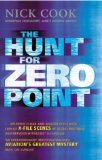 Hunt for Zero Point
Hunt for Zero Point
by Nick Cook
Century, £17.99, ISBN 0712669531
I walked into the bookshop, my eyes glanced from side to side and then I saw it, “The hunt for zero-point”! My heart sped up as I slowly approached; here was the answer to the problems that had been plaguing me… Do you find the above prose style irritating to the point of distraction? I do, but unfortunately it was the style that Nick Cook decided to use when writing The Hunt For Zero-Point.
Nick Cook was a journalist with Jane’s Defence Weekly, a fact that I have managed to independently verify. I had heard a lot about antigravity and thought that this might be the book to pull together all the various strands of the pro- and anti- arguments into a sensible debate about the subject. I wish! The book is written in the first person and chronicles not the history of “antigravity” but the author’s attempts to investigate the field. The result is a bizarre entertaining high-tech film-noir thriller, but not a history book.
Mr Cook seems unaware of how history books should be written. First you present your facts and documents, then separately you interpret them. This book makes no distinction between the two — the reader is unaware of whether he is reading historical fact, or supposition. The research into the subject, however, was excellent. I have found many of the documents he mentions on the Internet. (Some of T T Brown’s antigravity patents mentioned in the book can be found at www.soteria.com/brown/info/patents.htm. The document “ELECTROGRAVITIC SYSTEMS: An examination of electrostatic motion, dynamic counterbary and barycentric control” which was supposedly a study funded by the U.S. Government and mentioned in the book can be found at www.padrak.com/ ine/INE24.htm).
The gist of the book is that in the 30s and 40s there was a lot of work concerning new propulsion systems, jet engines, rockets, pulsejets, and also anti-gravity machines, some of which was instigated by the Nazis.
The book goes on to “prove” that this information was hushed up by the US Government in the 50s and that the anti-gravity programs went on as “deep black” projects in Area 51 and other such sites. Personally, I think that Nick Cook has unearthed enough information to support the idea that research was hushed up in the 50s… (The CIA dabbled in telepathic spying so the idea of antigravity research isn’t too far fetched.) However, the simple fact of a lack of antigravity 747s or Stealth bombers throws doubt on the idea that these projects came up with anything. A more realistic scenario is that these secret research projects carried on for a few years, came up with nothing, and were cancelled.
If you’re interested in antigravity then I would recommend getting this book from a library. It holds up quite well as a science-fiction thriller, but not a science history book. The book does suffer from the lack of an index, but the bibliography is very useful. I would suggest obtaining the documents listed therein and making up your own mind.



